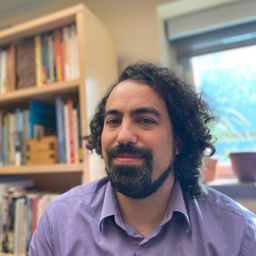
Dr Chao-Shiang Li
Chao-Shiang Li holds a PhD at the Ironbridge International Institute for Cultural Heritage, University of Birmingham, UK. Chao-shiang is the Assistant Professor in the Department of Interior Design, China University of Technology in Taiwan, the advisory of the New Taipei City Museum Development Committee, and the Correspondent of Asian Network of Industrial Heritage. He was the associate researcher of Cultural Properties Research Center, CUTE by conducting a series of heritage programs. His interests lie in how people produce, interpret and consume heritage within a changing and cross-cultural world. As the shifting values in heritage are complicated and continuing, he is interested in exploring the relationship between the interpretations and (re)use of heritage by visiting the contextual narrative.
1. Li, C.S. (2022). The Development of the Public Sphere of Industrial Heritage in Taiwan: From Space Reuse to Place Making. In L.J. Wang & C.H. Wu, Diversified Breathing: Shuttling through the Public Sphere of Taiwanese Culture. Kaohsiung: CHULIU BOOK (In publishing).
2. Li, C.S. (2022). The International Regime on Industrial Heritage-A Case Study of Asian Network of Industrial Heritage. In J.C.Y Liu & C.Y. Wei eds. Taiwan’s International Cultural Relations: Culture as a Method. Kaohsiung: CHULIU BOOK, pp.149-192.
3. Li, C.S. (2020). A Curator for Urban Historic Locales and Narratives: Kaohsiung Museum of History. Chinese Association of Museums, ICOM Kyoto 2019 Conference Proceedings. Taipei: Chinese Association of Museums, pp. 310-327.
4. Li, C.S. (2020). Motivation of Youth Participation in Industrial Heritage, ANIH Bulletin 5, December 2020, pp. 7-11.
5. Li, C.S. (2020). A Converged Procession: Reinvention of Tradition in Mining Cultural Landscape. In: Eric Devos, Anne-Sophie Meurice, Anne-Françoise Morel Eds. Walking with Saints: Protection, Devotion and Civic Identity-The Role of the Landscape. Ronse: G.O.K.R.T.I. – C.H.A.R.T.I., pp. 246-257.
6. Li, C.S. (2019). The Forestry Culture and Technical Legacy in Taiwan: A Perspective of Heritage Conservation. Bimonthly Periodical, 152, p. 1-4.
7. Li, C.S. (2018). The History and Development of Taiwan’s Industrial Heritage. The Report of Minnan-Taiwan Cultural Development, pp. 146-168.
8. Li, C.S. (2018). The Conservation and Cultural Tourism of UK Heritage Railways. Journal of the National Taiwan Museum, 138: 32-41.
9. Li, C.S. (2018). Open Air, Open Mind-the creative approach of industrial heritage interpretation in Gold Museum, Gold Museum, New Taipei City Government Journal: 71-82.
10. Li, C.S. (2017). Revaluing Industrial Heritage: Participatory Governance in Urban Forestry Heritage and Historical Bridge Conservation. The Historic Environment: Policy & Practice, 8(3): 1-17.
11. Li, C.S. (2016). Visiting historic sites to open up future possibilities: The heritage of British rail. Journal of Cultural Heritage Conservation, 35:92-107.
12. Li, C.S. (2014). A Complex Tradition: Reading Japanese Industrial Heritage in Taiwan. Traditional Dwellings and Settlements Review. Whose Tradition? Biennial Conference of the International Association for the Study of Traditional Environments, 2014, Kuala Lumpur, Malaysia. 26(1): 48.
Sessions auxquelles Dr Chao-Shiang Li participe
Mardi 30 Août, 2022
The heritage of industrialisation is endowed with an emerged position or meaning to the past as well as the future, and this is part of the modernisation process within the context of industrialisation. The knowledge economy leads to the development of the remains of industrial culture towards a second industrial heritage revolution. The challenge follows and interrogates how industrial heritage can be made relevant (useful/meaningful) in an ostensibly post-industrial world. It refer...
Jeudi 1 Septembre, 2022
Many of the remained big scale Industrial heritage in Taiwan were the products of the Japanese colonial period between 1895 and 1945, which spans the first half of the twentieth century. This fifty-year colonial industrialisation is arguably Taiwan’s most influential industrial heritage because it began a rapid process of modernisation that is continuing today. The key to this process is the industrialisation that led to the development of main parts of the island, catalysed new communitie...
Many of the remained big scale Industrial heritage in Taiwan were the products of the Japanese colonial period between 1895 and 1945, which spans the first half of the twentieth century. This fifty-year colonial industrialisation is arguably Taiwan’s most influential industrial heritage because it began a rapid process of modernisation that is continuing today. The key to this process is the industrialisation that led to the development of main parts of the island, catalysed new communitie...
Sessions auxquelles Dr Chao-Shiang Li assiste
Dimanche 28 Août, 2022
Cet itinéraire d'une journée, le jour de l'inauguration du congrès, permettra aux visiteurs de découvrir Exporail à Saint-Constant, la Centrale hydroélectrique de Beauharnois et le
Explorez les abords du Canal de Lachine, berceau de l'industrie au Canada. Profitant de l'accès à l'énergie hydraulique, aux réseaux de transport maritime et ferroviaire, de nombreuses usines se sont installées sur ses berges. Des milliers de Montréalais y ont travaillé et habité. Transformés en parc linéaire, les abords du Canal accueillent aujourd'hui de nombreuses résidences.Une visite à pied conçue et guidée par Héritage Montréal....
Joignez-vous aux organisateurs du congrès et aux membres du board de TICCIH pour un cocktail de bienvenue et quelques mots festifs de présentation, dans l’ancienne forge de l’École technique de Montréal, fondée en 1909, aujourd’hui intégrée au campus de l’Université du Québec à Montréal.
Lundi 29 Août, 2022
Si la vallée du canal de Lachine a été le berceau de l’industrialisation canadienne, la géographie industrielle métropolitaine ne s’y est pas confinée, peu s’en faut, Outre les grandes concentrations d’entreprises des quartiers centraux, elle est constituée des réseaux infrastructuraux, d’une douzaine de centrales hydroélectriques et des ensembles manufacturiers disséminés dans une quinzaine de petites villes aujourd’hui intégrées dans l’aire métropolitaine. La conférence proposera un surv...
Mardi 30 Août, 2022
Cette session nous permettra d’explorer à travers neuf cas d’études internationaux les différentes stratégies de mise en valeur de patrimoines industriels ainsi que leurs impacts sur les communautés et leur territoire. L’analyse de musées, d’espaces culturels, de parcours et d’aménagements urbains sera l’occasion de mettre en relief les questionnements d’identité, de sens, de pertinence et d’impacts qui animent l’ensemble des acteurs de ce patrimoine en transformation. ...
During the Industrial Revolution coal was the most important energy source for both homes and industries. At the time, coal mining created strong regional industrial identities and mentalities, as well as industrial images and imaginaries in the eyes and minds of external observers. Such identities and ideas of coal would go on to shape industrial landscapes and communities.The papers presented in this session investigate the s...
This session focuses on company towns from the perspective of urban planning. “Company towns” are here defined as single-enterprise planned communities, usually centered around a single industry, where a company commissions an urban plan, builds housing for its workers, and sets up recreational, commercial, institutional or community facilities. While these are now endangered by a second wave of deindustrialization, we observe that, aside studies or monographs of individual towns that popu...
Drawing on case studies from diverse social, cultural, and political contexts the papers in this session discuss the different responses to maintaining and assessing not only the physical sustainability of industrial heritage but also the sustainability of its social values and meaning.
It is widely accepted that understanding a historic place is a critical first step to guide subsequent management and conservation. Industrial sites present a number of challenges as understanding their form, function, design, boundaries, and conservation often requires a high degree of technical expertise and experience. In Canada, gaining this expertise and information sharing is hampered by a limited number of institutions offering training in industrial archaeology and the lack of a na...
This session focuses on company towns from the perspective of urban planning. “Company towns” are here defined as single-enterprise planned communities, usually centered around a single industry, where a company commissions an urban plan, builds housing for its workers, and sets up recreational, commercial, institutional or community facilities. While these are now endangered by a second wave of deindustrialization, we observe that, aside studies or monographs of individual towns that popu...
Pays continent, dont l’industrialisation s’est amorcée dès le 19e siècle, le Canada a vu à la faveur entre autres de la désindustrialisation et de la requalification urbaine, des pans importants de son patrimoine industriel être altérés ou encore détruits. Cela étant dit, même ainsi, il n’en demeure pas moins que ce pays possède encore aujourd’hui un patrimoine industriel significatif. Or, le Canada étant une confédération, la protection et la sauvegarde de cet héritage industri...
Industrialization processes have been global from their very beginning. However, their interpretation still tends to be limited to specific locations or regions, and to specific time periods. Regularly, for example, it is stated that the industrial revolution started in Europe, from where it spread to the world, supposedly bringing technological and social progress to „less developed“ countries. Earlier periods of technology and knowledge transfer processes, that were already in place in t...
Les efforts visant à préserver le patrimoine industriel s'inscrivent dans un contexte socio-économique et politique précis. Mais qu'est-ce qui est préservé et pour qui ? Et, par ailleurs, quelle est la relation entre les sites du patrimoine industriel et les communautés ouvrières soumises à la désindustrialisation qui les jouxtent souvent ? Steven High examinera les façons dont la préservation du canal de Lachine à Montréal, le principal site du patrimoine i...
Mercredi 31 Août, 2022
Visite de l’exposition permanente : À cœur de jour, grandeurs et misères d’un quartier populaire, qui retrace l’histoire d’un des plus anciens quartiers industriel et ouvrier de Montréal. Découverte de l’ancien bain Généreux, bâtiment rappelant une époque ou la majorité des logements ouvriers n’avaient ni bain ni douche. Présentation de quelques éléments du patrimoine du quartier sur le trajet entre l’...
Le canal de Soulanges est une infrastructure, localisée sur la rive nord du Saint-Laurent, qui a été ouverte au trafic maritime en 1900, succédant alors au « vieux canal » de Beauharnois (établi depuis 1843 sur la rive nord du Saint-Laurent). Le canal de Soulanges a été abandonné en 1959, alors que s’ouvrait l’actuelle Voie maritime du Saint-Laurent qui relie les Grands Lacs à l’Atlantique. La conception du canal de Soulanges est due à l’ingénieur Thomas Monro (1831-1...
In this lecture, I would like to talk about deindustrialised communities, heritage and memory in the context of right-wing populism. Drawing on studies of memory and heritage, I argue that right-wing populists have cornered the market on talking about the past of deindustrialised communities. They have successfully misrepresented this rich and complex history to fuel rage, resentment, fear and reactionary nostalgia. Indeed, ‘the past’, and in particular the industr...
Jeudi 1 Septembre, 2022
The use of industrial heritage is a profoundly important factor in the process of creating a sustainable economic, social, and political future for many communities occupying industrial heritage landscapes. More than ever we recognize the need for such communities to be capable of shaping and expressing their heritage in different forms in the context of current events and issues, and in doing so to inform both contemporary decision-making as well as the way their industrial heritage is re...
This lecture will argue that the landscapes of industrial heritage that can be found in different parts of the world are directly related to the place-specific trajectories of deindustrialization. In other words: the different ways in which deindustrialization impacts on local communities has a direct bearing on the emergence of forms of industrial heritage. I will differentialte between deindustrialization paths and related industrial heritage regimes in a) Anglo-...
Le quartier Centre-Sud est un ancien quartier industriel et ouvrier ; son patrimoine est riche et unique. La visite permettra de découvrir, entre autres, l’usine Macdonald Tobacco et la confiserie Raymond, les anciens logements ouvriers typiques du quartier, et les réutilisations d’anciens bâtiments à des fins culturelles et communautaires. L’activité débutera au métro Frontenac et se terminera par une visite à l’Écomusée du fie...
Vendredi 2 Septembre, 2022
In the refusal of people in communities abandoned by industrial capital to abandon their own places, we can read an implicit critique of the mobility and unaccountability of capital, raised by those who were once inside (however tenuously or uncomfortably) and now find themselves marginalized, “left behind.” The desire to catch up again, whether through attracting new investment or transvaluing abandoned sites as tourist attractions, makes this an essentially conservative critique that is ...
Samedi 3 Septembre, 2022
Suivez les traces du réseau ferroviaire du Canadien Pacifique et des anciens ateliers Angus, qui ont joué un rôle majeur dans le développement industriel et résidentiel du quartier Rosemont. Cette visite vous propose de mieux comprendre l'histoire de différents sites industriels établis dans ce quartier et transformés aujourd'hui en milieux de vie et en pôles d'emploi.Une visite conçue et guidée par Héritage Montréal. Départ au coin des rues...













